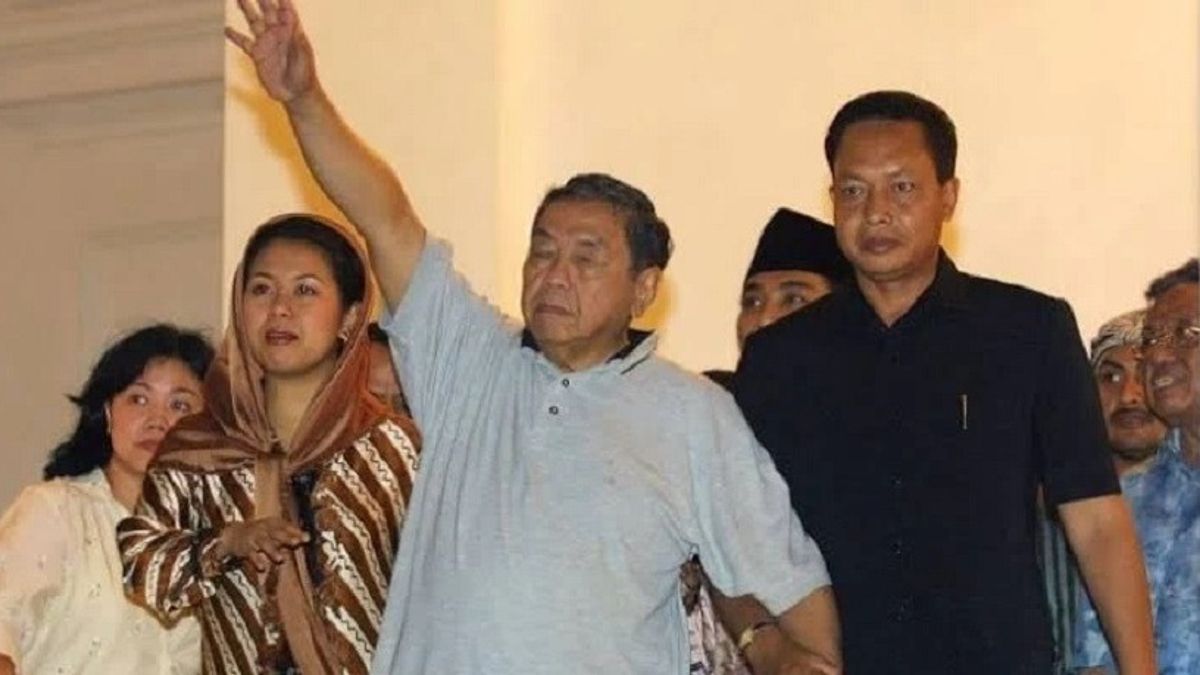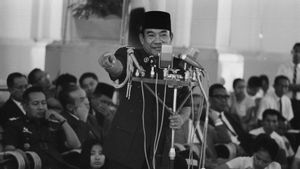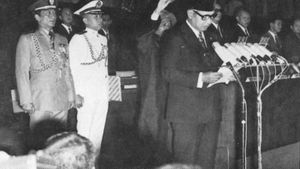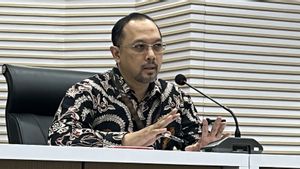JAKARTA - Abdurrahman Wahid (Gus Dur) is a true lover of discussion. Every time there was a discussion related to religion, politics, and pluralism, Gus Dur often attended. He is also known to actively participate in various recitations. Majelis Reboan (Wednesday Assembly), is one of them. His activities continued to last until Gus Dur became the number one person in Indonesia. He often holds discussions at the Presidential Palaces: the Merdeka Palace and the State Palace. Especially when entering the month of Ramadan. At that time, the Palace was actively holding iftar celebrations with the Majelis Reboan.
No one doubts Gus Dur's intellectualism. He had studied in the Middle East. From Al-Azhar University (Egypt) to Baghdad University (Iraq). This education filled him with Islamic and western literature. However, this abundant knowledge did not necessarily make Gus Dur forget himself.
He remains humble in his daily life. In fact, he is always thirsty for new knowledge. Especially when he returned home to Indonesia in 1971. Gus Dur actively participated in discussion forums with various themes. Islamic renewal became his favorite topic. Moreover, Gus Dur has always been challenged to develop an understanding of Islam that is able to respect local traditions.

Gus Dur also found the right forum. Majelis Reboan, its name. The discussion forum is in accordance with his interests. This is because Majelis Reboan is able to develop an open and plural discussion. Every Wednesday night, Gus Dur was often present. He himself was much inspired by the thoughts of Muslim scholars who took part in the discussion. Vice versa. Gus Dur has always been trusted to be the main resource person for discussions.
The participants who took part in the discussion were also excellent. Most of them are from the Islamic Student Association (HMI) and Indonesian Islamic Students (PII). Most interestingly, non-Muslim intellectuals were also present in the Majelis Reboan. Among others, were Franz Magnis Suseno, Mudji Sutrisno, and Victor Tania.
VOIR éGALEMENT:
“Gus Dur was also invited to join the intellectual circle of neo-modernism reform that was involved in the NGO line, namely the LKIS Foundation, and who was involved in a plural discussion forum known as the Majelis Reboan (established 1984). The two institutions helped to strengthen Gus Dur's ideas about secularization, pluralism, non-sectarianism, inclusivism, and the contextualization of Islam. This led to the formulation of its Islamic paradigm: the indigenization of Islam.”
“Through this paradigm, the traditionalists not only have a new intellectual weapon to defend their historical religious practice from the criticism of the modernist-reformers but also a new reason for placing the interests of Islam under the national interest. Wahid's individual intellectual ideas partly reflect his genuine commitment to pluralism, national interests, and democracy," said Yudi Latif in the book Genealogi Inteligensia (2013).
Iftar at the Palace
The culture of discussion continues to accompany Gus Dur to grow into one of Indonesia's Muslim scholars. He continued to follow the Majelis Reboan, even though he had become president of the Republic of Indonesia from 1999 to 2001. Gus Dur at that time was able to break everything down. Presidential protocol procedures are often violated. He did not want to give pause between himself and the community in the discussion.
Gus Dur also began to make other breakthroughs. He made the State Palace a space for open discussion. Especially during the month of Ramadan. Gus Dur made the State Palace a place for discussion which was packed with iftar and tarawih prayers with the Majelis Reboan in 2000.
Gus Dur's actions tended to be revolutionary. The state palace, which was once known as a place to entertain state guests, has turned into a place that is accessible to all. Especially Muslim scholars. The iftar agenda wrapped in the discussion was a great success and the most memorable.
One of the founders of the Kompas newspaper, Jacob Oetama, has experienced this. According to him, everyone who has ever participated with Gus Dur seems to have emotional closeness. They can freely express their views to match perceptions.

“He often violates the presidential protocol, driven by the inclination to unite with the people. To the extent that the Presidential Palace, which was originally isolated from the touch of the masses, has become a place for iftar and tarawih for the Fasting Month of the Majelis Reboan in 2000.”
“Of course, the simple populist appearance when he became President did not only occur at the iftar of the Majelis Reboan at that time. The photo showing Gus Dur in short pants and a short-sleeved shirt in the midst of uniformed guards is just another example. These examples simply emphasize that Gus Dur is a people who is President,” recalled Jacob Oetama in his opening remarks for the book Peace with Gus Dur (2010).
The moment of breaking the fast together at the Palace is the most awaited moment by Muslim intellectuals and scholars. They then waited for each other's turn to be present at the palace. Many are fighting because the opportunity does not come twice.
People say that the moment to meet Gus Dur at the Palace is known as the recitation at the palace. The format of the “recitation” is not much different from the general Majelis Reboan event. In which, all discussion participants participated in breaking the fast, tarawih prayers, and discussions. There is no difference between the speaker and the participant. Both wrapped in simplicity.

“The atmosphere in the afternoon was very light, like the usual atmosphere at the Majelis Reboan recitation. Sitting on the carpeted floor, Abdurrahman was surrounded by all his old friends in the assembly. Sitting on his right Drs. Amidan (chairman of MUI), then Bang Imaduddin Abdurrachim, Eki Syahruddin, and Mas Giat (Dr. Sugiat) the high priest of the assembly whom Jami'iyah admires because the choice of letters read during Tarawih prayers is always melodious, very pleasant to hear because the tajwid is standard in shalaf boarding school. ”
“On Gus Dur's left are Utomo Dananjaya and AM Fatwa and Dr Bactiar Mu'in, an ITB lecturer who has admired Gus Dur since he was still studying at the University of Wisconsin, USA. Behind the President sits a Jesuit priest, Father Muji Sutrisno, who has a mandate from his friends to represent the Majelis Reboan with his mentor," concluded Soetjipto Wirosardjono in the book Mikul Duwur Mendem Jero (2007).
The English, Chinese, Japanese, Arabic, and French versions are automatically generated by the AI. So there may still be inaccuracies in translating, please always see Indonesian as our main language. (system supported by DigitalSiber.id)














